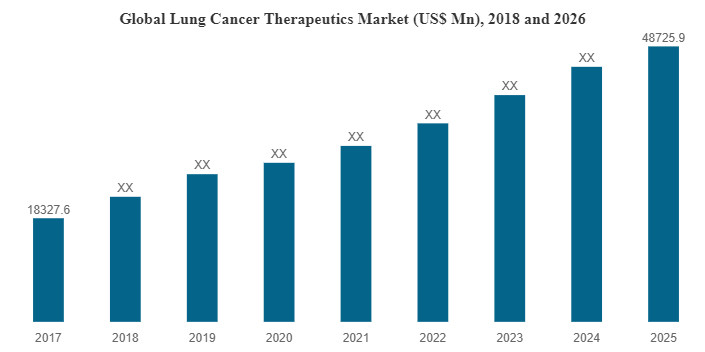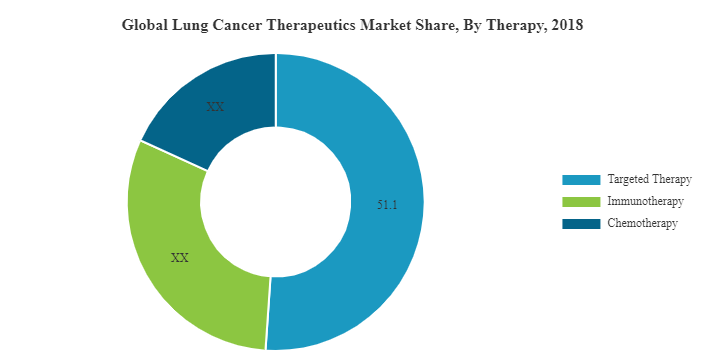Home / Healthcare / Medical Device / Lung Cancer Therapeutics Market
Lung Cancer Therapeutics Market Size, Share and Industry Analysis By Therapy (Targeted, Therapy, Immunotherapy, Chemotherapy), By Cancer Type (Non-small cell lung cancer (NSCLC), Small cell lung cancer (SCLC)), By Distribution Channel (Hospital Pharmacies, Retail Pharmacies, Online Pharmacies), and Regional Forecast 2019-2032
Report Format: PDF | Latest Update: Feb, 2025 | Published Date: Jun, 2019 | Report ID: FBI100473 | Status : PublishedThe global lung cancer therapeutics market size was valued at USD 18,327.6 Million in 2018 and is projected to reach USD 104,269.6 Million by 2032, exhibiting a CAGR of 13.3% during the forecast period (2018-2032). North America dominated the lung cancer therapeutics market with a market share of 44.16% in 2018.
Rise in cancer awareness in both developing and developed nations, and the emergence of new medical diagnostic equipment and advanced therapeutics have increased the number of lung cancer diagnoses, thus propelling the lung cancer therapeutics market growth. This, coupled with, increasing investments by major players in research and development activities are also boosting the global market growth. The change in the market is primarily driven by a greater focus towards the R&D initiatives due to increasing instances of lung cancer.
Existing market players operating in the global market are focusing on constant innovation and up gradation of their product portfolio with new and efficient product offerings for better treatment outcomes for the patients. Lung cancer is among the most commonly occurring cancers in the world and contributes to a significant number of deaths worldwide.

Some of the other factors which are also contributing to the lung cancer therapeutics market growth is the increase in the proportion of individuals who smoke and also due to other contributing factors such as exposure to toxins. The introduction of new and sophisticated targeted therapies such as VIZIMPRO by Pfizer Inc. is expected to drive the global lung cancer therapeutics growth in developed as well as emerging countries, during the forecast period 2019-2026.
"Increasing R&D advances leading to greater adoption of sophisticated and advanced therapies such as immunotherapy combined with the increasing prevalence of lung cancer is driving the growth of the global market"
Increasing adoption and demand for targeted therapies, which is considered to be the foundation of precision medicine due to the increasing R&D initiatives, is one of the most prominent driving factors for the growth of the global lung cancer therapeutic market in 2018. The targeted therapy segment is estimated to have the largest market share among therapy types. The targeted therapy segment accounted for a market share of 51.1% in 2018 and is expected to rise during the forecast period. Increasing focus towards the diagnosis of lung cancer and the subsequent treatment based on the accurate targeting of the tumor or the source of the cancer is also driving the growth in the targeted therapy segment.
The immunotherapy segment is estimated to grow at a faster CAGR during the forecast period. This is attributed to the increasing number of new product launches especially in the immunotherapy segment. Currently, there is increasing adoption of immunotherapy in the markets in developed nations due to its higher achievement in terms of efficient treatment leading to improved patient outcomes, and this is expected to contribute to the growth of the market at higher CAGRs during the forecast period.
Market Segmentation
Based on the therapy, the lung cancer therapeutics market segments include targeted therapy (which can be further sub-segmented into bevacizumab, dabrafenib/trametinib, erlotinib hydrochloride, osimertinib, and others), hormonal therapy (which can be further sub-segmented durvalumab, nivolumab, atezolizumab, pembrolizumab), and chemotherapy. The targeted therapy segment dominated the global market in 2018.

The segment accounted for 51.1% share of the market in 2018. Based on distribution channel, the global market segments include hospital pharmacies, retail pharmacies, online pharmacies, and others. Based on cancer type, the lung cancer therapeutics market segments include non-small cell lung cancer (NSCLC), and small cell lung cancer (SCLC).
Regional Analysis
"Growing prevalence of lung cancer and increasing adoption of lung cancer therapeutics expected to result in the highest CAGR in the Asia Pacific"
North America generated a lung cancer therapeutics market revenue of US$ 8,093.2 Mn in 2018 and is anticipated to account for a dominant share in the global market during the forecast period. Growth witnessed in the region is likely to be driven by the increasing adoption of advanced lung cancer therapeutics and rising prevalence and diagnoses of lung cancer. This is especially applicable in instances where the lack of adequate treatment leads to metastasis and subsequently, death. In developed countries, the adoption of advanced immunotherapies is increasing along with the existing therapies of chemotherapy and targeted therapy.
The lung cancer therapeutics industry is estimated to increase in Europe, due to growing regulatory approvals and the adoption of advanced therapeutics in the region. Whereas, in emerging countries such as India and China, the rise in prevalence of lung cancer is fueling growth in the lung cancer therapeutics market during the forecast period. In countries like China and India, there is an existing dominance of chemotherapy. However, in countries like Japan, there is increased adoption and expenditure towards advanced immunotherapies and targeted therapies. The Latin America and Middle East & Africa, the markets represent future potential for growth due to increasing adoption of advanced therapeutics.
Key Market Drivers
"Genentech, Inc. (F. Hoffmann-La Roche Ltd), Bristol Myers Squibb and Merck Sharp & Dohme Corp. to be dominant players in the lung cancer therapeutics market"
Genentech, Inc. (F. Hoffmann-La Roche Ltd), emerged as the leading player with the highest lung cancer therapeutics market share in 2018, as the company has a number of product offerings in the targeted therapy and chemotherapy segment, though it trails behind in terms of immunotherapies. The company accounts for the highest revenue shares in the lung cancer therapeutics from regions such as North America and Europe.
In addition, other market players are also getting product approvals such as Pfizer, Inc., product offering of VIZIMPRO. Other players operating in the market are Boehringer Ingelheim Pharmaceuticals, Inc., Eli Lilly, and Company, Celgene Corporation, AstraZeneca, Pfizer Inc., Sanofi, Novartis AG, Millennium Pharmaceuticals, Inc. (Takeda), Bristol Myers Squibb, Merck Sharp & Dohme Corp., Astellas, etc.
List of Companies Profiled
- Genentech (F. Hoffmann-La Roche Ltd)
- Eli Lilly and Company
- Celgene Corporation
- AstraZeneca
- Pfizer Inc.
- Sanofi
- Novartis AG
- Astellas
- Bristol Myers Squibb
- Boehringer Ingelheim Pharmaceuticals, Inc.
- Millennium Pharmaceuticals, Inc. (Takeda)
- Merck Sharp & Dohme Corp.
- Other players
Report Coverage
The increasing prevalence of all types of cancers are prevalent in the general population and lung cancer is one of the most common forms of cancer. The increasing prevalence and rising incidence of lung cancer across all demographics and across all the age groups have led to increasing demand for lung cancer therapeutics. According to the American Cancer Society (ACS), about 13% of all new cancer diagnosis are lung cancers.
The lung cancer therapeutics market report provides qualitative and quantitative insights on the industry trends and detailed analysis of market size and growth rate for all possible segments in the market. The market segments include therapy, distribution channel, cancer type, and geography. On the basis of therapy, the market segments include targeted therapy, immunotherapy, and chemotherapy.
Targeted therapy is further sub-segmented into bevacizumab, dabrafenib/trametinib, erlotinib hydrochloride, osimertinib, and others. Immunotherapy is further sub-segmented into durvalumab, nivolumab, atezolizumab, and pembrolizumab. On the basis of distribution channel, the market is categorized into hospital pharmacies, retail pharmacies, online pharmacies, and others, while the market is classified on the basis of cancer type into non-small cell lung cancer (NSCLC) and small cell lung cancer (SCLC).
Along with this, the report analysis includes lung cancer therapeutics market dynamics and competitive landscape. Various key insights provided in the report are the prevalence of lung cancer therapeutics by key countries, regulatory scenario by key regions, key industry developments and overview of current advances in R&D for lung cancer therapeutics.
SEGMENTATION
ATTRIBUTE |
DETAILS |
By Therapy |
|
By Cancer Type |
|
By Distribution Channel |
|
By Geography |
|
Key Industry Developments
- In March 2019, Adorx Therapeutics Limited., announced that it had entered into a strategic partnership with Johnson & Johnson Innovation LLC and Lung Cancer Initiative at Johnson & Johnson (LCI) for the development of new novel lung cancer therapeutics.
- In June 2016, the American Society of Clinical Oncology (ASCO) announced that a new antibody drug conjugate showed early promise in the treatment of small cell lung cancer (SCLC).
Frequently Asked Questions
How much is the of the lung cancer therapeutic market worth in 2026?
As per our (Fortune Business Insights) study, the lung cancer therapeutic market is predicted to reach USD 48,725.9 Million by 2026.
What was the value of the global lung cancer therapeutic market in 2018?
In 2018, the lung cancer therapeutic market was valued at USD 18,327.6 Million.
At what CAGR is the lung cancer therapeutic market projected to grow during the forecast period (2019-2026)?
The lung cancer therapeutic market is projected to grow at a CAGR 13.0% during the forecast period (2019-2026).
Which is the leading segment in the lung cancer therapeutic market by therapy?
Targeted therapy is the leading segment in lung cancer therapeutic market by therapy.
What are the key factors driving the lung cancer therapeutic market?
Growing prevalence of lung cancer, increase in the adoption of lung cancer therapeutics, and growing therapy launch through persistent investments in R&D by key players are the key factors driving the growth of the lung cancer therapeutic market.
Who are the top players in the lung cancer therapeutic market?
Genentech, Inc. (F. Hoffmann-La Roche Ltd), Bristol Myers Squibb and Merck Sharp & Dohme Corp. are the top players in the lung cancer therapeutic market.
Which region is expected to hold the highest share in the lung cancer therapeutic industry?
North America is expected to hold the highest share in the lung cancer therapeutic industry.
- Global
- 2018
- 2015-2017
- 159


